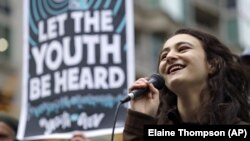American high school student Jamie Margolin had not expected to be in her bedroom right now.
Before the coronavirus arrived in her hometown of Seattle, Washington, she had made plans to keep herself very busy. Margolin was planning to take part in the traditions of her final year of high school, including the student dance known as prom and graduation.
She was also preparing to travel across the United States as part of a campaign with other climate activists. She planned to hold a series of events to support the release of a new book she wrote. And she was going to attend one of the huge protests planned this week to mark the 50th anniversary of Earth Day.
The continuing coronavirus crisis brought all those plans to a halt.
“But still so much to do,” Margolin told an Associated Press reporter in a video interview from her bedroom.
Like many other young activists who have helped create an international climate movement, she is not letting a spreading virus stop her. The activists are now organizing in place, from the U.S. to Ecuador, Uganda, India and elsewhere.
Some fear the pandemic has harmed their progress. But they are determined to keep pushing - and for now - are making use of technology to get their message out.
Unable to gather in large groups as they had planned this Earth Day, these young activists are planning special online events. They hope such events will keep the issue of climate change alive during the U.S. presidential race, as well as across the world.
One event, Earth Day Live, is being organized by a group of youth-led climate groups, including Zero Hour. Margolin is a leader of the group.
In some countries, online organizing is more difficult. In Uganda, activist Mulindwa Moses says only about a third of the population has wireless internet. Also under stay-at-home orders, the 23-year-old graduate student is waiting for his chance to return to planting trees and speaking to his nation’s youth in person.
Like many activists, Moses first became interested in local issues that led him to see the connections to worldwide climate change. While traveling in eastern Uganda, he met with families who had lost their homes in mudslides caused by very heavy rainfall.
So, last year, he began a campaign to urge citizens to plant “two trees a week” and regrow their forests. The effort is aimed at fighting the destruction of forests and protecting against increasing mudslides caused by intense weather events.
In Ecuador, 18-year-old Helena Gualinga also has had to suspend her world travels.
Gualinga is from Ecuador’s indigenous Kichwa-speaking Sarayaku community — home to about 1,200 people in the Amazon. She says she learned from the example of her parents and community how to speak up for the rights of her people. Their fight has been against a government that they believe has given their land too freely to mining and oil companies.
Gualinga told the Associated Press that she still remembers important lessons she learned by attending community meetings with her parents when she was small. “The energy I remember from my elders growing up was that my community was always very worried,” she said. Now, she says, “I know I have a voice.”
Mulindwa Moses plans to run for his country’s parliament next year. “I want to fight to change the system from the inside,” he said.
Tia Nelson is the daughter of the late Senator Gaylord Nelson of Wisconsin, who established Earth Day. She said her father would be pleased with the determination of this generation, just as he was with young people who made the first Earth Day in 1970 a great success.
“The climate youth movement today is having a significant and important impact in doing exactly what my father had hoped on the first Earth Day — that he would get a public demonstration … to shake the political establishment,” Nelson said.
She added, “The youth movement 50 years ago did that. The youth movement today around climate change is doing the same thing.”
I’m Pete Musto.
Martha Irvine and Christina Larson reported on this story for the Associated Press. Pete Musto adapted it for VOA Learning English. Bryan Lynn was the editor. We want to hear from you. Write to us in the Comments Section.
_______________________________________________________________
Words in This Story
interview – n. a meeting at which people talk to each other in order to ask questions and get information
graduation – n. the act of receiving a diploma or degree from a school, college, or university
pandemic – n. an occurrence in which a disease spreads very quickly and affects a large number of people over a wide area or throughout the world
determined – adj. having a strong feeling that you are going to do something and that you will not allow anyone or anything to stop you
indigenous – adj. produced, living, or existing naturally in a particular region or environment
elder(s) – n. a person who is older
significant – adj. large enough to be noticed or have an effect
impact – n. a powerful or major influence or effect








